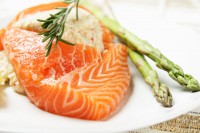
According to the Centers for Disease Control and Prevention, smoking is the number one cause of preventable disease in the United States, and the link between smoking and cancer of the lung has been well-established for decades. Now researchers are finding that diet can also increase the risk of developing lung cancer.
Can carbohydrates lead to cancer?
Glycemic index (GI) measures how much a food’s carbohydrate content raises blood sugar. GI is used by diabetics to manage their diet, and it’s been studied as a possible factor in several types of cancer, such as colorectal, stomach and ovarian.
A research team at MD Anderson Cancer Center in Houston questioned a group of people recently diagnosed with lung cancer about their eating habits, income and other lifestyle factors. Results were compared to a control group of people without the disease.
Data shows that people who reported eating many foods with a high GI were 50 percent more likely to be in the group with lung cancer. Surprisingly, non-smokers with a high GI diet were found to be twice as likely to have the cancer as smokers with similar eating habits.
How high GI foods increase cancer risk
While doctors are not yet sure what drives the connection, they suspect it may have to do with high GI foods raising the body’s insulin production, which affects cell growth. These insulin-like growth factors (IGF) may in turn fuel the uncontrolled cell growth that leads to cancer.
Non-toxic immunotherapy treatments used at Issels® have been used successfully in patients with all types of cancer, including lung, breast and colon. Contact us for more information.

